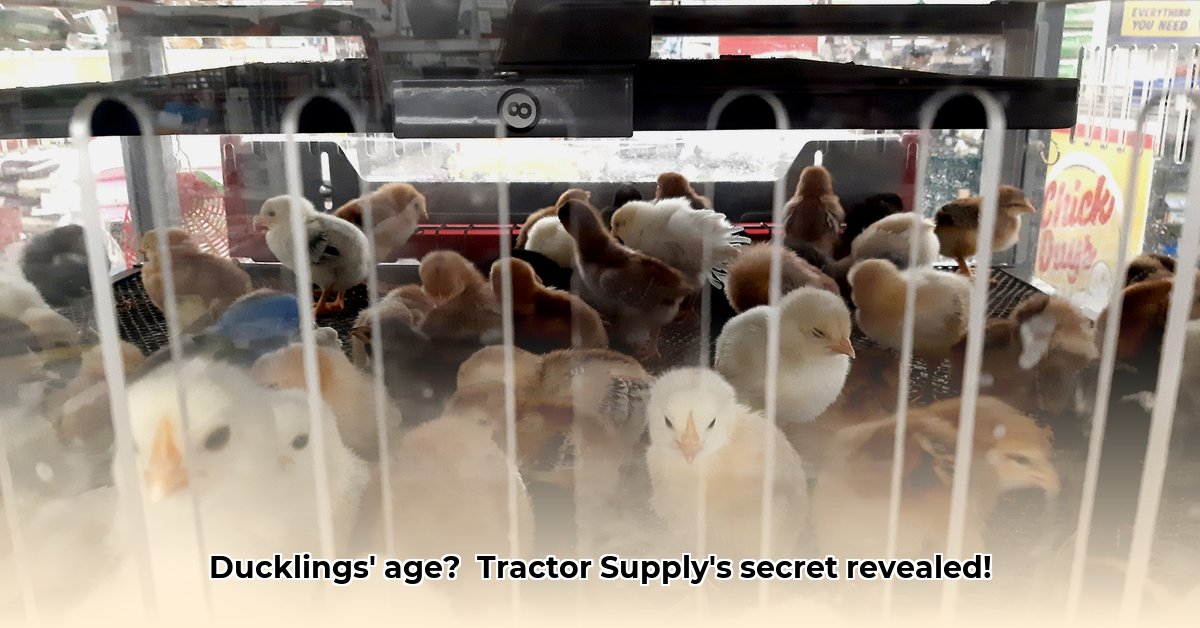
How Old Are Ducks From Tractor Supply?
Thinking about adding ducks to your backyard flock? Tractor Supply Company (TSC) is a popular option, but understanding the age and care requirements of their ducklings is crucial for their well-being. This guide will help you make informed decisions, ensuring your new feathered friends thrive. For more information on equipment to help care for your ducks, check out this guide on lawn tractors at Tractor Supply.
The Age Factor: Understanding Duckling Development
Tractor Supply typically sells ducklings between 24 and 28 days old. This age is chosen because they've generally finished weaning and are more independent and easier to handle than younger ducklings. However, the ideal age for a duckling's well-being is a subject of ongoing discussion among animal welfare experts, with some advocating for slightly older ducklings to better handle the stress of transportation and new environments.
What Breeds Can I Find at TSC?
Duck breeds available at TSC vary seasonally and by location, but you'll likely find popular breeds such as:
- Pekin Ducks: Large, white ducks known for prolific egg laying and meat production.
- Muscovy Ducks: Quieter and more independent than Pekins, prized for their flavorful meat.
- Call Ducks: Miniature ducks often kept as pets.
Always call your local TSC store to confirm breed availability before visiting.
Ethical Considerations: Responsible Duck Ownership
Purchasing young ducklings from TSC raises ethical considerations. Ducklings at this age haven't had extensive human interaction, which can impact socialization. The transportation process can also cause stress. While TSC aims to minimize this, it's important to understand the potential impact on the ducklings' well-being.
Comparing TSC's offerings to local breeders reveals another dimension. Local farmers may provide more gentle handling and socialization, potentially resulting in happier, healthier ducks. This is a key consideration when weighing the pros and cons of each option.
Setting Up Your New Ducklings for Success: A Step-by-Step Guide
Bringing home your new ducklings requires preparation. Follow these steps for a smooth transition:
- Prepare Housing: Create a safe, dry, draft-free space. A brooder (heated enclosure) is recommended for the first few weeks. Ensure adequate ventilation to prevent ammonia buildup.
- Provide Bedding: Use absorbent materials like pine shavings. Avoid cedar shavings, which can be toxic to birds.
- Fresh Water is Essential: Provide fresh, clean water in shallow containers at all times. Ducklings need access to water for hydration and natural behaviors.
- Appropriate Nutrition: Use high-quality duckling starter feed formulated for their nutritional needs. Never feed them bread or other unsuitable human foods.
- Maintain Cleanliness: Regularly clean the enclosure to prevent disease and the buildup of harmful bacteria.
- Handle with Care: Handle ducklings gently and frequently to help them adjust to human contact and build trust.
- Gradual Outdoor Introduction: Gradually introduce your ducks to the outdoors as they mature.
TSC vs. Local Sources: Making an Informed Decision
Choosing between Tractor Supply and local breeders involves weighing several factors:
| Feature | Tractor Supply Company | Local Farmers/Breeders |
|---|---|---|
| Price | Generally lower initial cost | Often higher |
| Age | Typically younger (24-28 days) | Often older, potentially more independent |
| Breed Variety | More limited selection | Wider variety often available |
| Animal Welfare | Potential for higher stress during transport | Generally better handling and socialization practices |
| Community Impact | Supports a larger corporation | Supports local economy and sustainable agriculture |
The optimal choice depends on your priorities. If cost is paramount, TSC may be suitable. However, prioritizing animal welfare and supporting local farmers offers other significant benefits.
Conclusion: Responsible Duck Ownership
Purchasing ducklings is a commitment. We've explored the age, breeds, and ethical considerations involved in buying from Tractor Supply, contrasting this with sourcing from local farms. Remember, responsible ownership involves providing safe housing, proper nutrition, and regular attention to your ducks' well-being. Make an informed choice that aligns with your values and your ability to provide excellent care. Further research on duck care practices is always recommended.
Resources
- Tractor Supply Company
- Your Local Farmers Market
- American Veterinary Medical Association (for general animal health information)